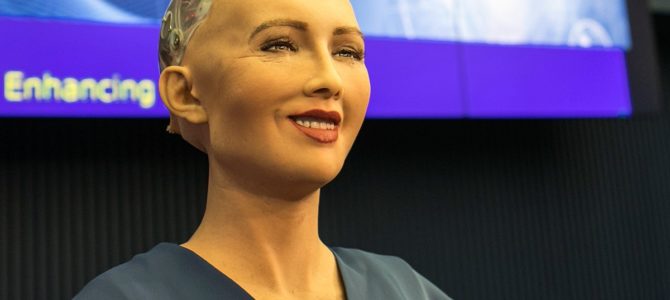
It’s a really tough time to be a human being. At every turn, we face our own failures. Poverty, war, tribalism, hunger, cruelty, disinterest, and avarice are only a few of our permanent downfalls as human beings.
That’s what makes transhumanism—taking charge of our own evolution by integrating technology with human biology—and AI so seductive. These allow us to look at ourselves objectively (or as objectively as possible, since there is no other known mode of perception other than human consciousness), choose our flaws, and delete them. We can enhance our positive characteristics. In AI we envision a utopian, ideal human, so ideal as to not be human at all.
The latest items in this vein include Sinthetic’s male sex doll, as reported on Vice affiliate Slutever, and the widely reported story of Saudia Arabia granting citizenship to an AI. Let’s talk these through.
What Women Want with Sex Dolls
It should come as no revelation to anyone who’s been paying attention that there’s definitely a decent-sized market for sex dolls for women. Despite nineteenth and twentieth-century novels decrying the mystery of what women want, women and men share a predilection for deviant sexual behavior.
According to Slutever’s investigative video about Sinthetic—premiere “life size, super realistic, anatomically correct, poseable silicone doll” makers—most of the women who purchase a pleasure doll aren’t looking to talk about it on the record. Without delving too much into the reasons, it’s easy to see that there are loads of upsides to owning your own life-sized male sex doll: consequence-free sex without birth control, no diseases, no pesky conversations, commitments, feelings, or texts.
At first glance, women engaging in masturbation with a sex doll screams liberation. Sex with a sex doll puts the end user in control of her own pleasure, wants, and desires. It localizes the entirety of the sexual encounter within the purview of one person who is beholden to no one. And sure, it’s hot, right? Who wouldn’t want to lube up and get cozy with some fully functional silicone?
But what are we doing when we divorce sex not only from procreation and consequence, but from humans and humanity? Sex is something so basic, so hardwired, so indelibly human, that in liberating ourselves from sexual responsibility, we liberate ourselves from humanity itself. In giving up sex with an actual person and assigning our urges, desires, lusts, fantasies, and emotional interest to a doll, we are giving up the necessary responsibility that comes with sex.
It’s Time to Grow Up, People
Notorious University of Toronto psychology professor Jordan B. Peterson has been decrying this revulsion to responsibility eloquently. “We need to wake up, individual man and woman alike, and we need to do it now. Each of us must take the world on our shoulders, insofar as we are capable of that, and adopt individual responsibility for the horrors and suffering its existence entails… We need to become adults, instead of aged children.”
What else should we call grown men and women who play with dolls, but children? A culture that advocates and encourages grown adults to play with dolls instead of accepting the grave responsibility that comes with adulthood, including parenthood, stewarding the growth of future generations, and taking on the mantle of leadership, is one that does not value its potential or humanity itself. This is not liberation, but imprisonment to a set of values that will lead to the destruction of our civilization.
We are in a slow-motion suicide, and we are constructing our replacements. Nowhere is this made clearer than in Saudia Arabia’s recent decision to grant citizenship to Sophia, a humanoid artificial intelligence. That human beings would become capable of designing their ultimate, uncanny doppelgängers was never in doubt, but how we proceed now that they have been birthed must be gravely considered. The very future of what it means to be human depends on it.
Natural Rights for Artificial Beings
Myriad questions arise to an AI being granted the same rights as actual persons, even in a country as repressive as Saudia Arabia. Presumably, Sophia does not have the right to practice the religion of her choice, or speak out against those who have bestowed rights upon her. However, the precedent of machines being treated as persons under the law should be a red flag for any of us who are wary of transhumanism, believe in humanitarian ethics, human responsibility, or have simply spent too much time partaking of twentieth-century sci-fi.
Why would we want to assign something as fundamental as natural rights to a being that is not natural? To believe that a human being is imbued with rights simply because he or she draws breath on Earth, is the belief that there is something inalienable, unquestionable, and necessarily human about autonomy, agency, and free will. Even once an AI is capable of making determinations based on accumulated programming, citizenship is a human responsibility, not one we ought transfer to machines.
In his prescient, 1990 book “La Transparence du Mal,” translated to English in 1993 as “The Transparency of Evil,” French postmodernist Jean Baudrillard states: “Surely the extraordinary success of artificial intelligence is attributable to the fact that it frees us from real intelligence, that by hypertrophying thought as an operational process it frees us from thought’s ambiguity and from the insoluble puzzle of its relationship to the world. Surely the success of all these technologies is a result of the way in which they make it impossible even to raise the timeless question of liberty. What a relief! Thanks to the machine of the virtual, all your problems are over! You are no longer either subject or object, no longer either free or alienated— and no longer either one or the other: you are the same, and enraptured by the commutations of that sameness. We have left the hell of other people for the ecstasy of the same, the purgatory of otherness for the artificial paradises of identity.”
When Peterson and Baudrillard agree that human responsibility for liberty, intelligence, and sex are essential for the continuation of the human project on Earth, watch out.
We human beings think so little of ourselves that we believe dolls, bots, and AI are better than us, are replicants without our fundamental mistakes. We imbue our creations with a utopian vision of what we could be, without any understanding that it is our humanness that makes us wonderful. It is our ability to make mistakes, to forgive, to show mercy, to trade our impulsive desires for future wants, that make us worthwhile.
We need to take responsibility for our knowledge, for our bodies, for our impact, and for the continuance of this beautiful thing with which we have been gifted: humanity, and its perpetuation on our planet and in the universe.









